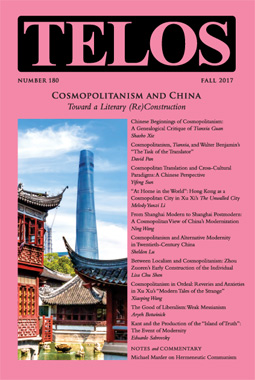David Pan’s “Cosmopolitanism, Tianxia, and Walter Benjamin’s ‘The Task of the Translator'” appears in Telos 180 (Fall 2017), a special issue on Cosmopolitanism and China. Read the full article at the Telos Online website, or purchase a print copy of the issue in our online store. Individual subscriptions to Telos are now available in both print and online formats.
 As a term, cosmopolitanism defies simple understanding. Already in its earliest formulation, attributed to the ancient Greek Cynic Diogenes, the merging of cosmos and polite to mean “citizen of the world” had a paradoxical meaning, imagining both local belonging as a citizen and lack of a specific place in the world. If the Cynics’ notion of cosmopolitanism arises out of a rejection of conventions in general rather than the embracing of a world system, they were left in an empty space between locality and universality. This tension between belonging and universality continues into the current discussion of cosmopolitanism as a term that spans political and cultural discussions. While the modern cosmopolitan political project seeks to lay out a common institutional framework for human society, the accompanying cultural project in fact works against such unity by seeking to promote the recognition and toleration of cultural differences.
As a term, cosmopolitanism defies simple understanding. Already in its earliest formulation, attributed to the ancient Greek Cynic Diogenes, the merging of cosmos and polite to mean “citizen of the world” had a paradoxical meaning, imagining both local belonging as a citizen and lack of a specific place in the world. If the Cynics’ notion of cosmopolitanism arises out of a rejection of conventions in general rather than the embracing of a world system, they were left in an empty space between locality and universality. This tension between belonging and universality continues into the current discussion of cosmopolitanism as a term that spans political and cultural discussions. While the modern cosmopolitan political project seeks to lay out a common institutional framework for human society, the accompanying cultural project in fact works against such unity by seeking to promote the recognition and toleration of cultural differences.



